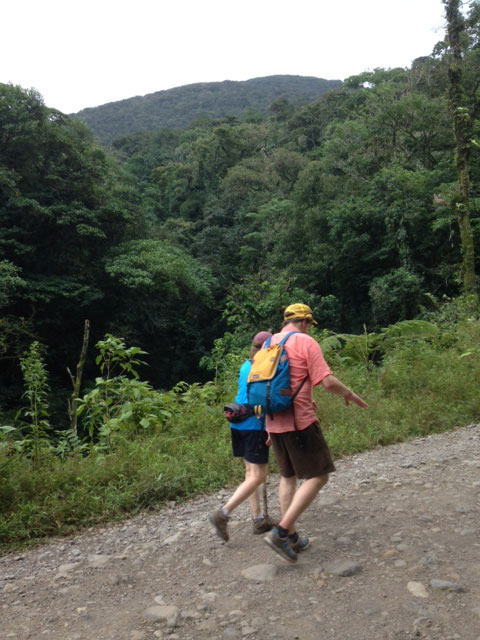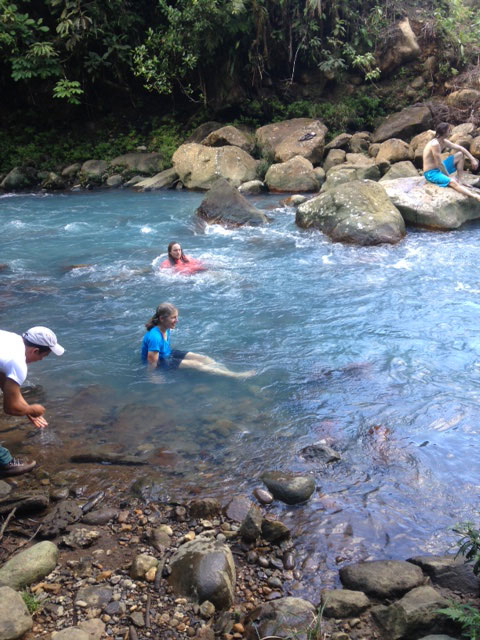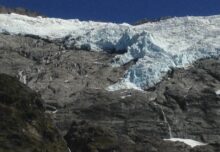Tapirs, Monkeys and Frogs
 It’s Saturday morning and we have the day off. After breakfast – rice and beans – the five of us gather water bottles and a few oranges. The volunteers at Heliconias Lodge now include Julia, a college student from Buffalo, NY. Julia’s never traveled before and she’s had a rough beginning, overwhelmed by the strangeness of Costa Rica. Now that she’s at Heliconias she’s beginning to calm down.
It’s Saturday morning and we have the day off. After breakfast – rice and beans – the five of us gather water bottles and a few oranges. The volunteers at Heliconias Lodge now include Julia, a college student from Buffalo, NY. Julia’s never traveled before and she’s had a rough beginning, overwhelmed by the strangeness of Costa Rica. Now that she’s at Heliconias she’s beginning to calm down.
We’re going to hike up to Laguna Danta, which translates to Lake Tapir. The danta/tapir is a pig-like animal with an upturned snout. We’d all like to see one wading in the lake but we know they are elusive. Our trail branches off the main rainforest loop and has a warning that it shouldn’t be attempted without a guide. Edwin told us that the trail is steep and slippery but he trusts us to negotiate it. As we walk I am reminded of an Adirondack trail that goes straight up a steep mountainside.
It’s a beautiful morning with a blue sky and a mild breeze. We walk fast, enjoying the deep woods, the trees and vines that are unfamiliar but also remind us of other vegetation on other mountain trails. There’s an odd vine that runs up some of the bigger trees and has a long green fruit like a curved cucumber. I heard one of the Costa Rican guides say this is one of the favorite foods of the danta.
Up and up, this trail does not bother with switchbacks. I love the challenge of finding handholds and footholds to pull myself up. The trail reaches a wooded ridge but there are enough breaks in the vegetation that we can see the mountain above us. The top of it is in the clouds.
We reach the lake after an hour and a half and I am surprised by the subtle beauty of this small lake in the woods. If I squint to blur the rainforest trees this wooded spot could be in the Adirondacks. It’s a peaceful place and we linger to enjoy the view, hoping for a danta sighting but there are too many of us to be unobtrusive. We are satisfied to have seen the beauty of this hidden spot.
On Sunday Helder, Julia and Jay decide to hang out around the lodge while Tom, Lee and I go on a long walk. There’s a national park just a stone’s throw away from Heliconias Lodge but no way to access it except for a walk down to Bihagua and up the next drainage. We could of course hire a taxi but that would make it too easy.
It takes an hour to walk to the road that leads to the park and we discover that many tourists are traveling today, by bus or car, to see the Rio Celeste, a river that appears bright aqua in the guidebooks. We are the only walkers on the rough dirt road that climbs through pastures filled with cows back up into the rainforest. We pause to admire a tree full of howler monkeys as tourist vehicles bump on by.
Our lunch spot is in a dry stream bed surrounded by thick vegetation and we share crackers, cheese and peanut butter, an exotic meal. Refueled, we continue walking and as we get closer to the entrance to the park we pass a small coffee farm, a soda (the Costa Rican equivalent of a cafe) and finally a long row of parked buses and cars.
We’ve been walking for hours and we still have to retrace our steps so we decide it’s not worth the twelve dollar a head entrance fee to the park’s trails. What I really want to see is the aqua Rio Celeste and by walking another kilometer on the road we can see it for free.
 It doesn’t disappoint us. The river really is paintbox blue and we join some families swimming in the bright water. Mission accomplished! By the time we get back to Heliconias Lodge we’ve walked thirty kilometers, seen trees full of parrots and monkeys, and enjoyed every minute of a perfect sunny day.
It doesn’t disappoint us. The river really is paintbox blue and we join some families swimming in the bright water. Mission accomplished! By the time we get back to Heliconias Lodge we’ve walked thirty kilometers, seen trees full of parrots and monkeys, and enjoyed every minute of a perfect sunny day.
A few days later we walk down to the village of Bihagua after work to buy fruit, peanuts and beer at the store and make arrangements to do a frog walk after dinner. A local entrepreneur has set up a business and his sign advertises many species of colorful frogs.
We hike the three kilometers back up the mountain, eat our rice and beans (supplemented this evening with Pilsen and Imperial, the two favorite Costa Rican beers) then head back down again with headlamps. The steady downhill takes us out of the rainforest and past houses filled with children and dogs.
Now that it’s dark the frog business looks more impressive. We wait at a small arch blazing with lights, as if we are about to enter a circus tent. Our guide soon arrives with his previous group of customers. They are smiling and one woman gives us a thumbs-up.
We cross a swinging bridge into the darkness. The frog man swings his flashlight back and forth and lets it linger on a small translucent frog. We crowd in to look. Before long we have seen several species, brightly colored and properly tropical. It is a wonderful treasure hunt. Julia jumps when the flashlight focuses on a frog that is as big as a small cat. And we all crowd around when our guide shuffles through a pile of leaves and pulls out a small red frog. After he holds out the guidebook to a page showing the poison strawberry dart frog we step back a little.
The walk continues and we get better at spotting the frogs ourselves, small amphibians clinging to tall leaves. Near the end of the trail we stop at a shed where the frog man houses a poisonous viper and two injured toucans, bonus animals.
We re-cross the swinging bridge and pay for our tour under the glare of the circus lights. The previous tourist was right, this was a thumbs-up experience, worth the ten dollars a head and the long walk back up to Heliconias Lodge.
Next comes a full week of helping out at the lodge. On some days we work on the trail with Adriel and Frank. Other days we are each assigned different jobs – weeding gardens, cleaning rooms, whitewashing a gate. Always we are hungry at each meal for our rice and beans and in the evenings we hang out on our wide porch to read and talk. Once we do a mini frog walk with Edwin and Lux to find occupants for the new frog ponds that Helder and Tom have helped construct. It seems the frog business is catching on.
Courtesy of North Country Public Radio.




